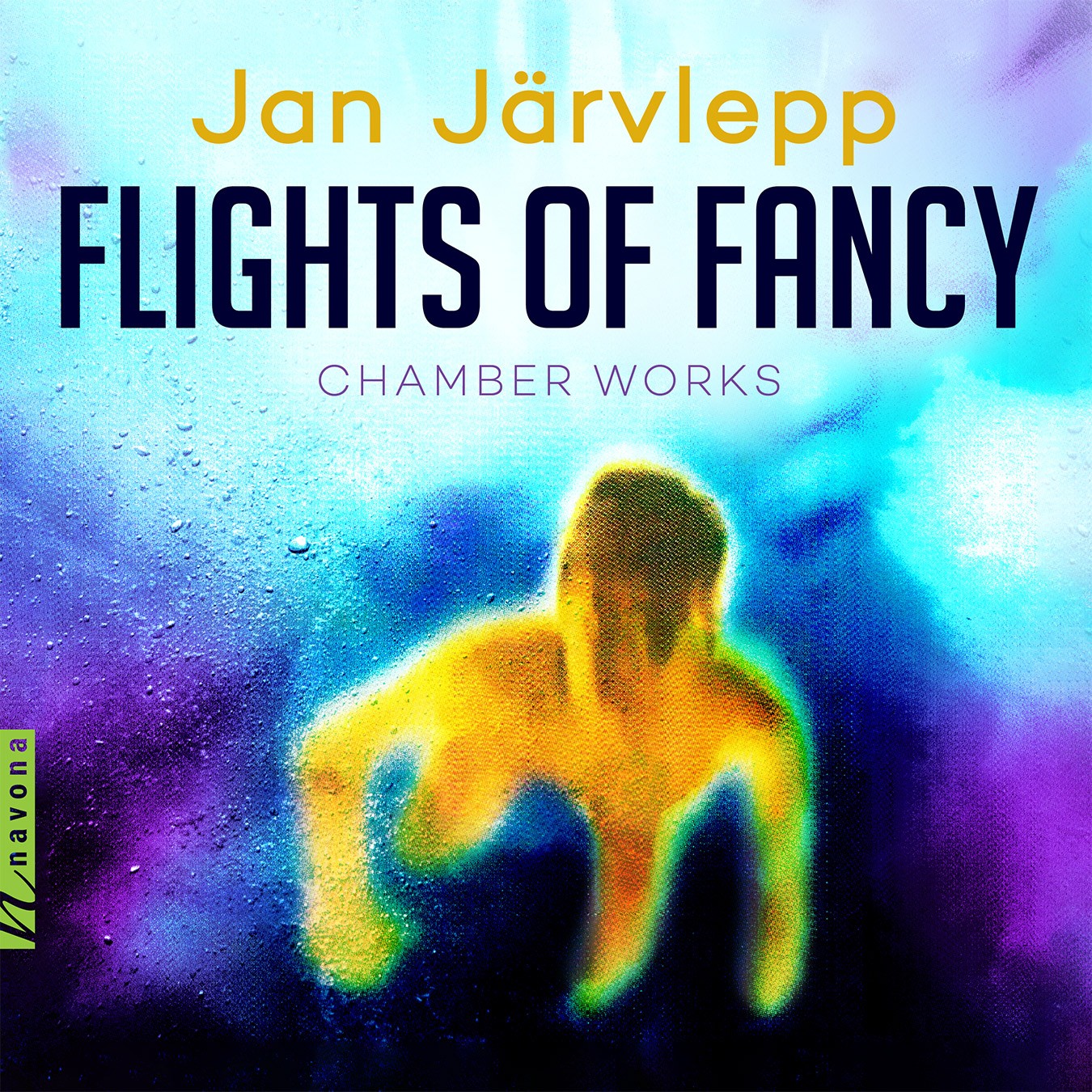
Composer Jan Järvlepp’s FLIGHTS OF FANCY is available now through Navona Records. Fusing European and American musical traditions, the album pairs the excitement of rock and jazz rhythms with classical orchestral and chamber music forms.
Today, Jan is our featured artist in “The Inside Story,” a blog series exploring the inner workings and personalities of our composers and performers. Read on to discover his unique take on the tarantella…
Can you explain the names of some of these pieces? Titles like Cadillac and Pierrot Solaire deviate quite a bit from what’s expected of piece titles.
Baritone saxophone player Peter Smith told me that when he played the first movement of my sax quartet, he felt like he was cruising down the highway in a 1959 Cadillac. That’s the one with the big fins. So I changed the name of that movement from the original title to “Cadillac” to reflect his experience. I could just imagine him driving on a sunny day, grinning with his mustache and sunglasses. Unfortunately, he died at a relatively young age from a heart condition, so this recording gives us a souvenir of how he played. He can also be heard playing clarinet in my Overture, the last track on the same album.
Pierrot Solaire is, of course, a play on the name of Arnold Schoenberg’s famous “Pierrot Lunaire,” the highly influential early 20th century modernist work. I was feeling rebellious after my 9 years of university studies because I had been force-fed atonal modernist music the whole time. I decided to write highly accessible unapologetically tonal music complete with lots of parallel fifths and parallel octaves, which the traditional theory professors would not allow. Not only that, I integrated pop music influence and some Finnish folk music influence. Even fun is allowed! Old Arnold would not be happy.
By the way, Pierrot Solaire has been my most popular chamber music work for the last 20 years, so maybe my rebellious tonality and accessibility has struck a chord with some people. But the music theory professors might argue that I have sold out.
Where does the album title, FLIGHTS OF FANCY, come from? Why is this the title of the album?
This is actually the title of the first movement of my Trio No. 2 for piccolo, viola and cello, which is on this album. There are three major piccolo solos in that piece, which I refer to as flights of fancy because they are rather flighty and fast-moving. But then flights of fancy are also capricious moments in life perhaps characterized by poor judgement or a lack of restraint — for example, putting a $100,000 down payment on a Lamborghini and then buying some $5,000 watches on the credit card after a three-martini lunch.
Fortunately, an underwater photo of me swimming in a pool made me seem suspended, as if in flight, and led to an imaginative cover. Montreal composer and photographer John Winiarz captured that image.
One attempts to get away from boring and predictable titles and covers, especially when one is not a star. On the other hand, “Brahms Trios” is a perfect title since he is a well-known entity.
Tarantella consists of electric guitar and electric violin, an unusual arrangement. Can you explain your reason for this arrangement and what you aim to achieve with it?
The name of the game is rhythmic excitement. I rely on the open strings of both instruments to permit rapid fingering patterns. It truly is a European/American hybrid since I take the triple time Tarantella dance idea and combine it with some hot, AC/DC-style rock guitar playing. I love doing these mixtures. I guess it is autobiographical since I grew up in North America in a Finnish-Estonian family. We spoke Finnish at home, which was like a little piece of Europe. But then the family got a TV when I was about 11 or 12 and suddenly The Three Stooges, the Batman theme and the Beatles on the Ed Sullivan Show started invading our house, along with cultural delights such as professional wrestling. However, Coca-Cola, Oreo cookies and Kraft Dinner never entered our house, so I was now living in two cultural worlds.
I don’t know if anyone will ever want to dance to this since it goes so much faster than a conventional tarantella. Each player spews out 600 notes per minute so the listener is bombarded with 1,200 notes per minute. It almost fuses into a steady stream.
I tried to compose it to be a little longer but every time I added new material it seemed like excess baggage, so I kept it short and intense like a comet.
It has also been played with piccolo replacing the violin. Both versions, as well as all of the other scores on this recording, are available from J. W. Pepper.
What advice or encouragement would you give to younger artists?
Now that I have passed the “official” retirement age of 65, there is one point that I would like to put across: Don’t wait for success to come knocking on your door; you’ll die first.
With the exception of some precocious talents that are identified early in life (Mozart, Yo-Yo Ma, Leila Josefowicz, Jan Lisiecki), most teenagers will not become highly successful and will proceed through their university or conservatory training and then enter the working world upon graduation. Then they will have to compete amongst each other for success. That will mean self-promotion in one way or another. For some, it may simply consist of doing a lot of auditions until success is attained.
In Canada, I can’t get my music on CBC Radio, and most symphony orchestras and chamber music organizations will not touch my music with a ten-foot pole. When I was younger, I thought that this situation would change if I just waited long enough. There is no sign of that, so I have learned that lesson and now I pass it on to younger people.
Fortunately the orchestras in Croatia and Czechia are not shy about recording my music. In fact, they did a great job on my album CONCERTO 2000!
With this in mind, I am very happy with my ongoing working relationship with PARMA Recordings and the releases of my music on Navona Records. Now my music can reach places that I don’t even know about and that I couldn’t possibly access on my own.
Is there any song or piece of music, in any genre, that you wish you’d written?
I have a special affinity for the last three symphonies of Sibelius. I think that I will listen to them for the rest of my life. They resonate with me on an emotional level, even if they have none of that American pop culture influence that I like to play with. I wouldn’t want to copy the great master but I would like to figure out how he constructed these masterpieces. As I said in a previous interview, the great masters don’t reveal their secrets very willingly and that is particularly true in these late works. Nobody can figure how No. 6 was composed, and nobody has offered a satisfactory explanation of why the Swan Hymn, as it is called, at the end of No. 5 is so effective. It’s something to chew on and to aspire to.
And then there’s the “Daybreak,” or the Sunrise moment in Ravel’s ballet Daphnis and Chloé. I remember playing in the middle of the orchestra and hearing all of those glorious sounds around me. The three flutes were behind my right ear, the three oboes were behind my left ear, and the three clarinets and three bassoons were behind them in this extraordinary soundscape. I was in audiophile heaven. Who wouldn’t want to write that music?
If you could only play one instrument for the rest of your life, what would it be and why?
As a younger man, I would have never believed what I am about to say. Having retired from playing the cello after 52 years, (38 of them in the Ottawa Symphony Orchestra) I am quite content to play the nothing. In other words, I am getting so much satisfaction from being a full-time composer that I don’t want to go back to practicing an instrument which is, after all, time consuming. Sure, I try stuff out on the piano and I pull out the guitar and the bass guitar every now and then. Fortunately, due to the presence of frets, they are easier to play than the cello, which requires daily practice if you hope to play in tune. So I may do something with the guitars yet. I continue to love the metallic twang of Fender guitars with single-coil pickups.
Oh, I know what I want to play! The stock market (but only at a profit).
Explore Jan’s Latest Release
FLIGHTS OF FANCY
FLIGHTS OF FANCY is available now from Navona Records. Click here to visit the catalog page and explore this album.

Composer Jan Järvlepp creates a genuine European/American musical fusion by combining the excitement of rock and jazz rhythms with the large-scale classical structures found in orchestral and chamber music. The seriousness of his well-thought-out forms and the immediacy of contemporary rhythmic and melodic ideas make a potent brew that is appealing to both open-minded classical listeners and pop music listeners who are searching for something new.

